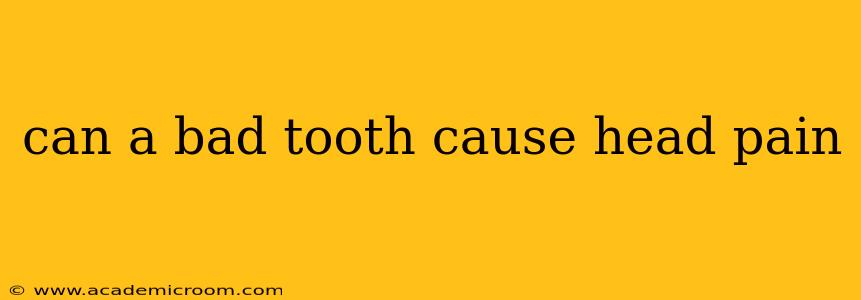Yes, a bad tooth can absolutely cause head pain. This isn't just a coincidence; there's a direct connection between your teeth and your head, primarily due to the intricate network of nerves and blood vessels in your facial area. Ignoring tooth pain can lead to significant discomfort and potential long-term problems, so understanding the link is crucial.
How Does a Toothache Lead to Headaches?
The pain you feel from a bad tooth isn't just localized. The trigeminal nerve, a major cranial nerve, is responsible for sensation in your face, including your teeth, gums, and the areas around your eyes and temples. When a tooth is infected, inflamed, or severely damaged, it irritates this nerve, sending pain signals to the brain that are often interpreted as a headache. The pain can radiate to various areas of your head, making it difficult to pinpoint the exact source.
What Types of Tooth Problems Can Cause Head Pain?
Several dental issues can trigger head pain:
- Tooth Infections (Abscesses): An abscess is a pus-filled pocket of infection at the root of a tooth. The pressure and inflammation from this infection can easily cause significant pain that radiates to the head.
- Severe Tooth Decay: Advanced cavities can expose the tooth's nerve, leading to intense pain and potentially spreading infection, causing headaches.
- Gum Disease (Periodontitis): Inflammation of the gums can also irritate the trigeminal nerve and cause referred pain in the head.
- Bruxism (Teeth Grinding): Grinding your teeth, often unconsciously at night, can strain your jaw muscles and temporomandibular joint (TMJ), leading to headaches.
- Sinus Infections: While not directly related to teeth, sinus infections can sometimes mimic tooth pain and cause head pain. The proximity of the maxillary sinuses to the upper teeth can make distinguishing between the two difficult.
What Does a Toothache Headache Feel Like?
A toothache headache often presents as a sharp, throbbing, or dull ache concentrated around the affected tooth, but it can spread to the temples, forehead, or even the back of the head. The pain may be worse at night or when chewing. It's important to differentiate it from other headaches; a toothache headache is often accompanied by localized tenderness or swelling around the affected tooth.
How Can I Tell if My Headache Is From a Tooth Problem?
Identifying the cause of your headache requires careful evaluation. If you experience head pain alongside any of the following, it's crucial to see a dentist:
- Facial tenderness or swelling: Noticeable swelling or sensitivity to touch around the cheek, jaw, or gums near the potentially problematic tooth.
- Sensitivity to hot or cold: Discomfort when consuming hot or cold food or drinks.
- Loose tooth: Noticeable looseness or shifting of a particular tooth.
- Difficulty chewing or biting: Pain or discomfort when chewing on one side of your mouth.
What Should I Do if I Suspect a Tooth Problem Is Causing My Head Pain?
Don't delay seeking professional help. A dentist can diagnose the underlying dental issue and recommend appropriate treatment. Ignoring a toothache can lead to more severe complications, including the spread of infection, permanent tooth damage, and more intense pain.
Can Over-the-Counter Pain Relievers Help?
Over-the-counter pain relievers like ibuprofen or acetaminophen can provide temporary relief from the pain, but they don't address the underlying cause. They are a temporary measure to manage pain while you seek professional dental care.
When Should I See a Doctor or Dentist?
See a dentist immediately if you experience severe or persistent head pain alongside any signs of a dental problem. Delaying treatment can lead to serious complications.
This information is for general knowledge and does not constitute medical advice. Always consult with a qualified healthcare professional for any health concerns or before making any decisions related to your health or treatment.
